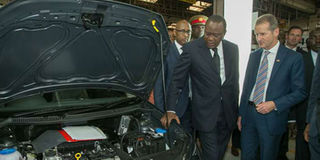German investors upbeat on Kenya

President Uhuru Kenyatta commission's the Volkswagen Production Line at Kenya Vehicle Manufacturers Limited in Thika on December 21, 2016. It is one of the many German companies that have set up shop in the country. PHOTO | PSCU
What you need to know:
- Naturally, Kenya has become the preferred platform for engagement and dialogue between Germany and Africa.
- Germany’s sharp interest in Kenya, especially during this election year, expresses the confidence it has in the country’s economic resilience.
- The summit will offer an opportunity for more extensive discussions.
Kenya will host the German African Business Summit from February 8 to 10 in Nairobi.
The event will be officially opened by President Uhuru Kenyatta.
It represents a key milestone for German-Kenyan and German-African relations.
The first summit in 2015 was held in Berlin but this year’s will take place in Africa.
Naturally, Kenya has become the preferred platform for engagement and dialogue between Germany and Africa.
This underlines the East African economic powerhouse’s growing profile as the de facto entry point into the region.
The summit will be attended by more than 400 high profile businessmen and policy makers, half of them from the $3.73 trillion German economy.
The overwhelming attendance of German citizens underscores its growing interest in Kenya.
Germany has an expansive footprint in Kenya, which is indicative of the potential it sees in the country of 45 million people.
As an example, the German Business Association Kenya is one of the largest and most influential bilateral business associations in the country.
RESILIENT ECONOMY
It has more than 150 members. Last year alone, five new major companies came to Kenya.
These included vehicle assembler Volkswagen, which reopened its assembly plant in Thika town.
Germany’s sharp interest in Kenya, especially during this election year, expresses the confidence it has in the country’s economic resilience.
Kenya and its neighbours have exhibited resilience at a time when economic growth across Africa has contracted due to the slump in global commodity prices.
The attractiveness of Nairobi has also played an instrumental role in endearing the country to German investors.
The city of 3.5 million outperforms its peers in the region primarily due to good infrastructure and, most significantly, a well-educated and highly skilled pool of university graduates.
Overall, German firms are upbeat about Kenya’s economic potential, explaining why the first German African Business Summit in Africa will be hosted here.
This notwithstanding, some challenges remain.
One is the growing skills gap for blue collar jobs, which is adversely affecting industrialisation prospects.
In Germany, the blue collar worker represents the first and most important element in a long chain of quality control.
In Kenya, German firms see that technical education for blue collar is viewed as less prestigious.
The smart and ambitious young Kenyans see technical and vocational training only as a second choice to a university course.
This has widened the technical skills gap. In contrast, the abundance of technical skills makes the difference in Germany.
Germans value talent and are willing to make long-term investments to develop it and retain it.
VOCATIONAL TRAINING
Consequently, German firms have established dual training schemes with Kenyan stakeholders and institutions to improve the quality of vocational training.
Late last month, Kenyan and international stakeholders organised “The Hands on the Future Conference and Skills Show” for Technical Vocational Education and Training at the KICC, Nairobi.
Germany was one of the key organisers.
Better technical and vocational skills present a win-win scenario for both countries.
Germany will be able to outsource manufacturing jobs to Kenya to enhance industrialisation.
The World Bank contends that the critical factor in the success stories in countries such as South Korea and Malaysia was the firm emphasis on technical education.
Kenya can replicate this. The summit will offer an opportunity for more extensive discussions.
We, as the Delegation of German Industry and Commerce in Kenya, are confident that the summit will offer great value to Germany, Kenya and African.
There is much to learn — not just from Germany’s big businesses, but also from its small and medium enterprises, which are renowned for their success.
Did you know that almost all the sodas and practically every beer consumed in Kenya are bottled by German machines?
The Nairobi summit will be a unique opportunity to appreciate what Germany has done in Kenya in the past decades and also to understand the bold vision it has for the country and the continent.
Maren Diale-Schellschmidt is the country director of the Delegation of German Industry and Commerce in Kenya. [email protected]




